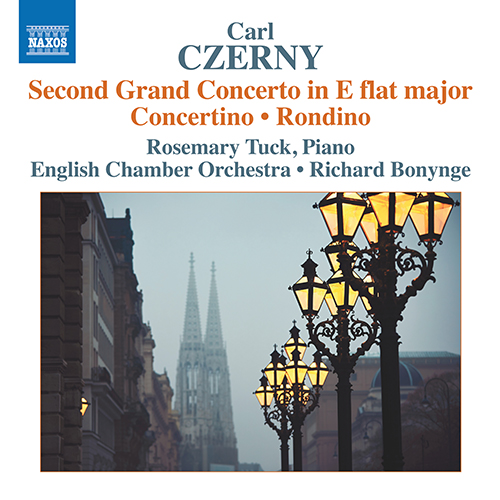CZERNY, C.: Grand Concerto No. 2 / Piano Concertino, Op. 210 / Rondino, Op. 127 (R. Tuck, English Chamber Orchestra, Bonynge)
Carl Czerny penned an astonishing amount of music, including the numerous potpourris, fantasies, teaching pieces and studies for which he became known. This recording features the delightfully entertaining Concertino in C major, Op. 210/213 (MS Op. 197), as well as the highly enjoyable Rondino, a work based on an enchanting theme taken from Daniel Auber’s opéra comique Le Maçon. A pupil and lifelong friend of Beethoven, Czerny was just 21 when he wrote the pastoral Second Grand Concerto in E flat major. Begun only twelve days after he had given the Viennese premiere of his mentor’s Emperor Concerto, the same choice of key seems a fitting homage to the grand master he so revered.
Tracklist
English Chamber Orchestra (Orchestra)
Bonynge, Richard (Conductor)
English Chamber Orchestra (Orchestra)
Bonynge, Richard (Conductor)
English Chamber Orchestra (Orchestra)
Bonynge, Richard (Conductor)
English Chamber Orchestra (Orchestra)
Bonynge, Richard (Conductor)
English Chamber Orchestra (Orchestra)
Bonynge, Richard (Conductor)
English Chamber Orchestra (Orchestra)
Bonynge, Richard (Conductor)
English Chamber Orchestra (Orchestra)
Bonynge, Richard (Conductor)
English Chamber Orchestra (Orchestra)
Bonynge, Richard (Conductor)
English Chamber Orchestra (Orchestra)
Bonynge, Richard (Conductor)
English Chamber Orchestra (Orchestra)
Bonynge, Richard (Conductor)
English Chamber Orchestra (Orchestra)
Bonynge, Richard (Conductor)

The Australian pianist Rosemary Tuck was born in Sydney. She studied with John Winther in Canberra before pursuing further study with Walter Hautzig at the Peabody Conservatory in Baltimore and finally with Andrzej Esterhazy, himself a pupil of Heinrich Neuhaus, in Moscow. She represented Australia in a series of recitals in America under the auspices of the Australian-American Bicentennial Foundation, including a recital at Carnegie Hall. She has performed in the Sydney Opera House, the Southbank Centre in London, the National Concert Hall in Dublin and the Musikhuset Aarhus in Denmark in the presence of Queen Margrethe II.
In 2001 she gave the first official performance in the William Vincent Wallace ‘Millennium’ Plaza in Waterford, Ireland. Tuck has appeared at the Aarhus, Wexford, Vendsyssel and Liszt en Provence festivals. She has worked closely with Richard Bonynge, AC, CBE, as both soloist with orchestra and collaborative pianist, and in 2020 was both artistic director and soloist for his 90th birthday gala in London.
Her other recordings include the composers Liadov, Ketèlbey, Wallace (Naxos 8.572774, 8.572775, 8.572776) and Czerny (Naxos 8.573254, 8.573417, 8.573688, 8.573998).
The English Chamber Orchestra (ECO) has been performing across the UK and globally for over 60 years, and is the most recorded chamber orchestra in the world. From its beginning, the ECO has worked consistently with the most significant figures in classical music, starting in 1960 with its first patron Benjamin Britten. The ECO celebrates and builds upon its tradition of maintaining the highest international musical standards, nurturing new talent and focusing on the ‘best of British’ music and musicianship. HM King Charles III has been the patron of the ECO since 1977, and the orchestra has performed at royal weddings, birthday celebrations and other events including the first concert ever to be broadcast from Buckingham Palace.
The orchestra has toured the UK and abroad with artists such as Benjamin Britten, Daniel Barenboim, Pinchas Zukerman, Dame Janet Baker, Sir Colin Davis, Plácido Domingo, Jacqueline du Pré, Kiri Te Kanawa, Yehudi Menuhin, Luciano Pavarotti, Murray Perahia, Itzhak Perlman, André Previn, Karl Richter, Mstislav Rostropovich, Sir Georg Solti, Mitsuko Uchida and Maxim Vengerov.
www.englishchamberorchestra.co.uk


Richard Bonynge, AC, CBE, was born in Sydney and studied at the New South Wales Conservatorium of Music and later with Herbert Fryer, a pupil of Busoni, in London. He made his conducting debut in Rome in 1962 with the Santa Cecilia Orchestra and has since conducted at most of the world’s opera houses.
He was artistic director of the Vancouver Opera and musical director of Opera Australia. He was awarded the CBE (Commander of the Order of the British Empire) in 1977, made Officer of the Order of Australia in 1983, Companion of the Order of Australia in 2012, Commandeur de l’ordre des Arts et des Lettres, Paris, in 1989 and Socio d’onore of the R. Accademia Filarmonica di Bologna in 2007. He married the late soprano Joan Sutherland in 1954.
He has recorded over 50 complete operas, made audiovisual recordings of many operas and recorded numerous ballets. Richard Bonynge is acknowledged as a scholar of bel canto in 18th- and 19th-century opera and a devotee of 19th-century ballet music. In 2012 he was awarded Australia’s highest honour, Companion of the Order of Australia, recognising ‘eminent service to the performing arts as an acclaimed conductor and music scholar’.

Precociously gifted as a pianist, Carl Czerny studied as a 10-year-old with Beethoven and made his first public appearance in Vienna in 1800, when he played Mozart’s C minor Piano Concerto. Impressed as he was by the performance style of Mozart, which he heard through Mozart’s pupil Hummel, he nevertheless became a leading exponent of the piano music of Beethoven, with its demands for a legato style suited to the newer forms of the instrument. Czerny’s principal fame, however, was as a teacher: his pupils included Thalberg, Liszt and Stephen Heller, and his pedagogical works had and continue to have wide currency.
Piano Music
Czerny’s principal works were in the form of exercises and studies, of which he wrote a very large number, extending up to his Opus 861, Studies for the Left Hand. His other piano music consists of sonatas and sonatinas, with various medleys, variations and other shorter pieces. He wrote music for piano duet, and for up to four players, with many arrangements and transcriptions.
Organ Music
With his usual facility, Czerny wrote a certain amount of organ music, of which the Prelude and Fugue, Op. 603 No. 3 is a characteristic example.
Orchestral Music
Czerny’s symphonies, overtures and concertos are generally unknown, some of them remaining unpublished.































